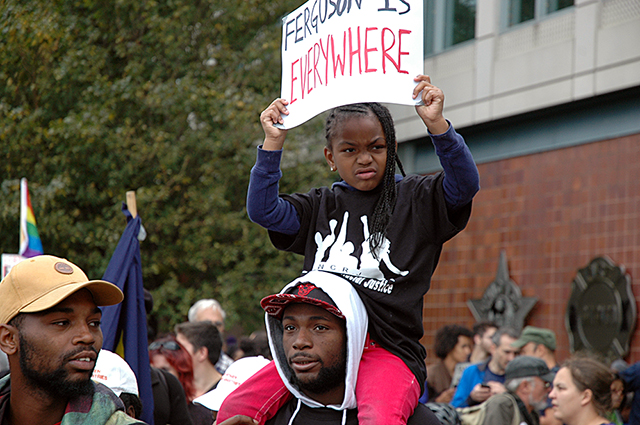FBI Director Claims 'Ferguson Effect' Is Causing More Crime
By aaroncynic in News on Oct 26, 2015 9:57PM

A child sits on a man's shoulders outside Chicago Police Headquarters at the beginning of a protest of the International Association of Police Chief's conference in October. (photo by Aaron Cynic/Chicagoist
The head of the FBI said he sees the tension between police and communities of color, but then doubled down on his blaming of the so-called "Ferguson effect"—the name for a phenomenon in which police say they are choosing to engage fewer people for fear of a situation becoming the next "Ferguson" thanks to social media.
According to the Tribune, while speaking at the University of Chicago Law School on Friday, FBI Director James Comey said he sees the situation getting worse:
"I imagine two lines: One line is law enforcement, the other line is the communities that we serve and protect, especially communities of color. What I see is those two lines arcing away from each other, at an increasing rate."
Comey, who is in town for the International Association of Chiefs of Police conference, which saw a massive protest on its opening day over the weekend, then said that violent crime in communities of color has increased while trust in law enforcement has decreased. Comey, who said law enforcement officers feel “under siege,” put at least some of the blame on the rise of cell phone cameras and the increase of media reports on police violence:
"In today's YouTube world, are officers reluctant to get out of their cars and do the work that controls violent crime? Are officers answering 911 calls but avoiding the informal contact that keeps bad guys from standing around, especially with guns?”
Mayor Rahm Emanuel said something similar earlier this month in the lead up to the IACP conference, the largest meeting of law enforcement officials in the nation. Unaware journalists were present, the Chicago Tribune reports the mayor said that cops have gone “fetal,” adding “they have pulled back from the ability to interdict. They don't want to be a news story themselves, they don't want their career ended early and it's having an impact.”
Comey, though acknowledging the highly disproportionate rate of people of color in prison, dismissed the existence of mass incarceration as “confusing.”
“Nobody “disappeared” from Richmond or New York or Detroit or L.A. in the 1980s and 1990s. Instead, case by case, bad guys were arrested, prosecuted, convicted, and sentenced. They didn’t “disappear”; they were removed from their neighborhoods to state and federal prisons, where they received the protections of the Constitution and where family and friends could visit them.”
Despite comments from Comey, Emanuel and other officials, little hard evidence exists that making the public aware of the use of excessive force and violations of civil liberties is to blame for Chicago’s high murder rate or upticks in crime in other cities like Ferguson. Analysis by the Atlantic of a report put together by the Sentencing Project shows that homicides were on the rise before Ferguson Police killed Mike Brown, and there’s little evidence to show a causal relationship between an increase in crime and an increase in demonstrations against police violence.
In fact, when New York City began to curtail its aggressive “stop and frisk” procedures after protests, NYPD Police Chief Bill Bratton pointed out that crime had also gone down. “Last year, when we had the lowest number of stop-question-and-frisks, we had much less crime,” said Bratton.
If anything, acknowledging that police aren’t above the law and paying attention to complaints that are backed up by video would be a start to helping repair a toxic and broken relationship between communities of color and police. As Curtis Black at the Chicago Reporter pointed out after Emanuel’s remarks, video of incidents gone wrong between civilians and police has validated complaints that would’ve otherwise been ignored. “New technology has facilitated a national conversation on police killings and misconduct that previously seemed impossible,” wrote Black.
Regardless, the demand for accountability will only continue grow, and blaming technology isn’t going to change that, writes Leonard Pitts, a columnist for the Miami Herald:
“This is about accountability, something that has been absent from police interactions with the public for far too long. And where there is no accountability, justice is tenuous. The plain truth is, cameras are here to stay; this genie will not go back in the bottle. Police will not stop the watchers from watching.”